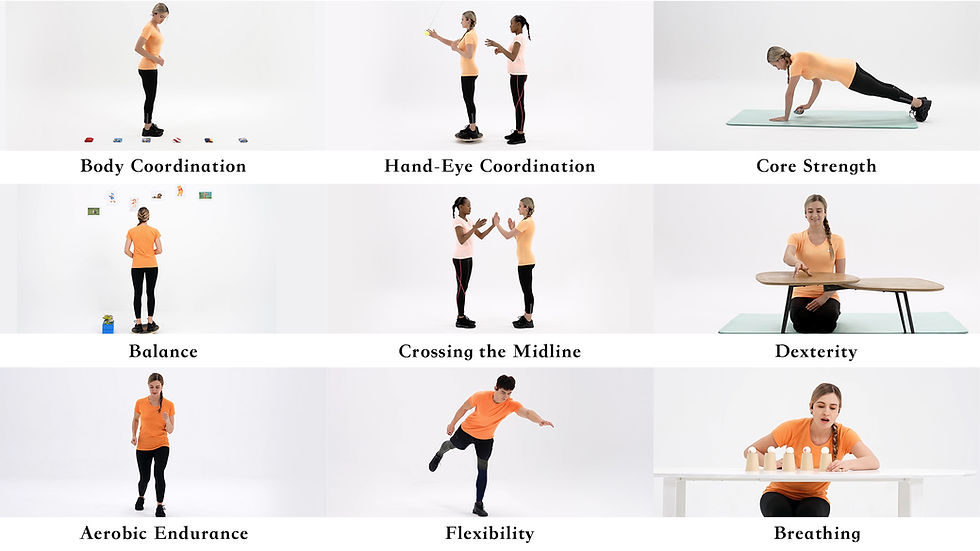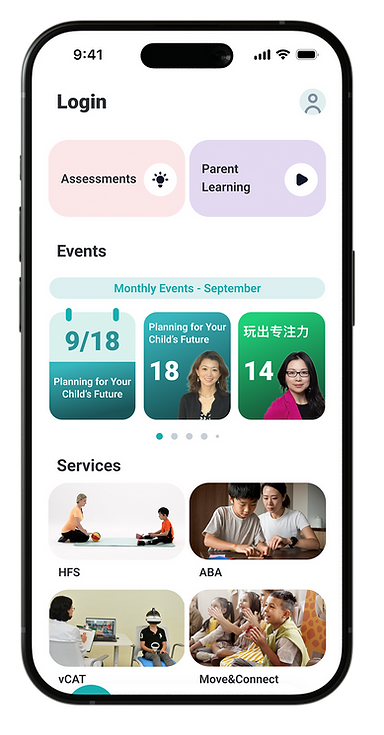HFS®Training– Building Focus, Self-Control & Communication
Does your child struggle to stay focused?
Do meltdowns or social challenges hold them back?
You’re not alone—and there’s hope.
The Hope Focus System (HFS®) is a structured, science-based personalized brain training program that combines movement, spectral music, and caring coach guidance. It helps children strengthen focus, emotional regulation, communication, and social skills—all in a fun, motivating way.
*Each child's eligibility is subject to regional center's approval.

Who Benefits from HFS®

HFS® is designed for any child who could use extra support in building essential life skills, including:
-
Children with Autism or ADHD
-
Children with Developmental Delays or Learning Challenges
-
Children who struggle with focus, emotional control, or social confidence
-
Families seeking a boost in learning readiness and overall success
Every child can grow a strong foundation—from sensory integration to confidence—step by step.

What Happens in HFS® Training
HFS® program is reviewed under the guidance of our professional advisory team, including a Board-Certified Behavior Analyst (BCBA) and Licensed Occupational Therapist (OTR), to ensure goals are functional, individualized, and aligned with evidence-based best practices.
Each session (60 or 90 minutes) is engaging, structured, and confidence-building. Your child will experience:
-
Structured Movement – Boosts sensory integration, balance, and coordination
-
Spectral Music (Bone Conduction) – Improves listening comprehension and brain network synchronization
-
Coach-Guided Sessions – Builds confidence and gives real-time feedback
-
Personalized Plan with Measurable Goals – Training that adapts as your child grows
Most families choose 2–3 sessions per week—in center, at home, online, or a flexible mix that fits your schedule.
A Program Personalized for Your Child
We begin with a thoughtful process to truly understand your child:
Parent Questionnaire (FAS)
Structured survey of abilities
Parent Interview
In-depth conversation about strengths, challenges, and goals
Additional Assessments (if needed)
Extra evaluations to better understand a child’s learning, attention, or behavior needs
Personalized Plan
A tailored training plan that grows with your child
What Families Notice
After about 40 sessions, parents often see:
-
Longer attention span
-
Better emotional control
-
Fewer meltdowns and more patience
-
Stronger social confidence
-
Clearer communication and self-expression
In fact, over 70% of families report noticeable improvements in focus and emotional well-being based on parent surveys after 40 sessions.


The HFS® Approach: Built on Connection and Growth
HFS® Training is guided by the science of neuroplasticity and Dr. Hallowell’s Cycle of Excellence:
-
Connection: Children feel safe, supported, and understood
-
Play: Learning happens through fun, engaging activities
-
Practice: Skills are reinforced consistently and meaningfully
-
Mastery: Children begin to succeed and feel capable
-
Recognition: Every achievement is celebrated, building pride and motivation
This approach transforms learning into a rewarding journey—helping children discover their strengths and shine.
Individualized Goals & Tracking
Each child has clear SMART goals in 5 dimensions, reviewed every 24 sessions. For example:

1、Behavior Management
Within 12 weeks, the child will use 1 taught calming strategy (deep breathing or holding a fidget) in 50% of observed opportunities, reducing meltdowns from 4 times/week to ≤2 times/week.
2. Psychological Motivation
Within 12 weeks, the child will accept starting a structured or preferred activity with 1–2 prompts at least 2 times per session.
3. Task Engagement
Within 12 weeks, the child will remain engaged in a structured activity for 2 consecutive minutes, in 3 out of 5 opportunities.
4. Communication / Language
Within 12 weeks, the child will follow a single-step verbal instruction with at least 60% accuracy, as measured during training sessions.
5. Social Interaction
Within 12 weeks, the child will engage in at least 2 interactions (greeting, turn-taking, or response) with the trainer, in 50% of opportunities.
Why Parents Choose HFS® Training
Parents choose HFS® because it blends movement, music, and personalized coaching to help children grow through neuroplasticity. Every program is unique—customized to your child’s needs and paced for steady, lasting progress.
Most importantly, we celebrate every achievement. Children leave each session stronger in skills—and also more confident, independent, and socially connected.

Comprehensive Skill Development
HFS® strengthens nine essential skill areas, across 20 difficulty levels with over 1,000 engaging movements:

HFS® App
Parents love our HFS® App—it keeps you connected to your child’s journey. Progress is tracked in real time, and parents can view training reports anytime. Even better, you can practice at home with your child, guided by the app and supported by our coaches every step of the way.

Flexible Formats
Every family is different. That’s why we offer:
-
One-on-one in-person sessions
-
Online training
-
At-home practice with coach support
This flexibility makes it easy to fit HFS® Training into your child’s daily routine and your family’s lifestyle.



HFS® Training: Helping your child build focus, self-control, and social confidence—one step at a time.
Important Note: HFS® Training is a structured brain training program designed to support focus, self-control, emotional regulation, and communication. It is not a medical treatment or a replacement for medical care. Families should continue to follow the guidance of their healthcare providers alongside HFS® Training.
1. Fundamental Abilities Survey (FAS)
Our comprehensive evaluation is based on the Five-to-Fifteen parent rating questionnaire. It helps us understand your child’s behavioral strengths and challenges across 13 key subdomains.
2. In-Depth Parent Interview
A one-on-one conversation with you as the parent or caregiver allows us to gather crucial information about your child’s behavior, preferences, and challenges in different environments.
3.Comprehensive Assessments for Children with Different Needs
Our comprehensive assessment process for HFS® includes thorough evaluations covering attention, physical abilities, emotional regulation, sensory processing, and social skills to ensure a holistic understanding of each child's needs.
4.Personalized AI-Assisted Plan Creation
Our AI system takes insights about your child from our team of experts and automatically creates a tailored plan to suit their needs.
Our comprehensive evaluation is based on the Five-to-Fifteen parent rating questionnaire. It helps us understand your child’s behavioral strengths and challenges across 13 key subdomains.

A one-on-one conversation with you as the parent or caregiver allows us to gather crucial information about your child’s behavior, preferences, and challenges in different environments.

Our comprehensive assessment process for HFS® includes thorough evaluations covering attention, physical abilities, emotional regulation, sensory processing, and social skills to ensure a holistic understanding of each child's needs.

Our AI system takes insights about your child from our team of experts and automatically creates a tailored plan to suit their needs.

Training Intervention Effectiveness Data: Presented at Stanford Medical School


Before & After HFS Intervention: FAS** Parent Rating Scores
An average of 40 HFS sessions significantly improves cognitive and behavioral skills.
It is particularly noteworthy that the average improvement for the the following categories is over 50% :
·Emotion Regulation ·Attention & Focus ·Impulsivity & Hyperactivity ·Language Expression
**FAS(Fundamental Abilities Survey)is a scientifically validated assessment framework that includes 13 major categories of cognitive behaviors, providing a 360° overview of each child.
Evidence-Based Practices
Our programs are built on a foundation of proven therapeutic techniques enhanced by cutting-edge technology.
Questions about HFS® Training
HFS® provides personalized one-on-one training, available in person or online.
Yes. All HFS® trainers complete APA-accredited courses. They build strong connections with children, follow Dr. Hallowell’s Five-Step Cycle, and adjust sessions based on detailed feedback reports.
HFS® is built on:
-
Five-Step Cycle – builds trust, motivation, and confidence.
-
Neuroplasticity – strengthens brain connections through practice.
-
Multi-sensory activation – engages visual, auditory, and motor systems.
-
Bone-conduction music – regulates focus and emotions.
-
2–3 sessions per week, 60 minutes each.
Improvements often appear after 12 sessions; significant progress around 40 sessions.
-
Better attention, focus, and emotional regulation
-
Improved motor coordination, balance, and auditory processing
-
Stronger social and communication skills
-
Increased confidence and academic success
-
Through the HFS App, which tracks session feedback, progress, and offers parenting resources. Over 85% of parents report behavioral and attention improvements.
HFS®: Multisensory, combines music + motor exercises, emphasizes attention, emotional regulation, and holistic brain development.
OT: Focuses mainly on functional tasks and fine motor skills.
HFS® is more integrated and engaging, while OT is task-focused.
-
ABA: Focuses on behavior correction.
-
HFS®: Focuses on communication, emotional regulation, and motor/attention development.
They can be done together for complementary benefits.
-
It targets attention, self-control, and social communication—core challenges for ASD/ADHD. Early training takes advantage of brain plasticity, leading to lasting gains in academics, emotions, and relationships.
Children and teens ages 4–18. Activities are adapted to each developmental stage.
Not yet. Payment options include:
-
Self-Determination Programs (SDP)
-
Regional center funding for social recreation
-
Private pay
-
